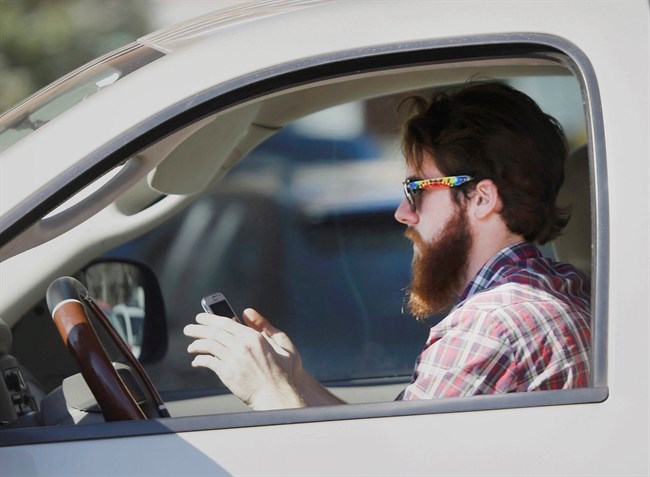 Forget raising the fines, seize the phones. If texting or talking behind the wheel is as big a problem as they say, killing more people than drunk driving, then take away the phones of repeat offenders.
Forget raising the fines, seize the phones. If texting or talking behind the wheel is as big a problem as they say, killing more people than drunk driving, then take away the phones of repeat offenders.
Alas, it’s not that easy, which leads to the question: What will it take to get people to stop?
I just watched a woman do the Lurch.
She was stopped at Hillside and Blanshard, eyes down on the device in her lap, when the light turned green. The driver behind her leaned on his horn, the startled woman glanced up — whoops! — and shot into the intersection like a panicked rabbit.
She didn’t check for pedestrians. Didn’t check cross traffic to see if someone was trying to beat an amber light. Just lurched ahead blindly, scrambling to get her head back into road mode.
I would have worked myself into a state of self-righteous indignation had I not been guilty of doing the Lurch myself.
This is how drivers kill people these days — not drunk, just distracted.
The authorities keep telling us that, which is why Justice Minister Suzanne Anton was talking this week about increasing B.C.’s $167 fine for distracted driving. This followed stories about a Vancouver man ticketed 26 times for using an electronic device. He was also driving while prohibited.
But that just proves the dilemma: Harsher fines and longer driving prohibitions are no barrier to people who ignore them. That’s what makes seizing phones seem an attractive alternative.
The idea popped up a year ago when former Victoria police chief Jamie Graham, who headed a traffic safety committee for the B.C. Association of Chiefs of Police, suggested drivers should lose their phones for 24 hours for a second offence and for up to five days for subsequent transgressions, with persistent offenders perhaps losing their devices permanently.
The proposal never was advanced by the chiefs’ association itself, though. Nor is the Justice Ministry considering it.
In large part, that’s because the notion of police seizing smartphones packed with sensitive personal information (and really, wouldn’t you like a gander at Rob Ford’s search history?) gives Canada’s courts kittens. It’s difficult to seize a computer without a search warrant, and today’s phones are computers. The current traffic safety chairman on the police chiefs association, the Transit Police’s Neil Dubord, says police are reluctant to take on the logistics of clearing this mucky minefield.
They would like to have a tool as effective as the vehicle seizures that came with B.C.’s roadside driving bans for excessive speeders and drinking drivers, though. “Some sort of immediate penalty has so much more impact,” Dubord says.
A sliding scale of fines might help. Ontario is looking at escalating penalties that would top out at $1,000 for repeat offenders. Some suggest treating repeat texters like drinking drivers, impounding their cars.
The status quo has proven a feeble deterrent to some. Local police were picking off the same guys two or three times in February’s distracted-driving crackdown. Sgt. John Price, a supervisor with the Saanich police traffic safety unit, says some see those $167 fines as a cost of doing business, one that they’ll pass on to clients.
This is despite stats showing distracted driving passing alcohol as a cause of road deaths and injuries. People haven’t yet reached the cultural tipping point where texting in traffic is seen as the same sort of social evil as drinking and driving, though.
There’s a sense of entitlement. Early in the morning, traffic cops look for parents texting or talking while rushing junior through school zones. Later in the day, they watch for decalled trucks and vans, tradesmen multi-tasking in traffic. Nobody is fooled by drivers who appear to have developed an unhealthy fascination with their own crotches.
The cops wrote 50 tickets in one 90-minute blitz on the Trans-Canada Highway leading out of Victoria on Feb. 20.
“Everybody knows it’s wrong,” said Price, who spent part of Thursday at the corner of McKenzie and Borden investigating a four-car crash that police suspected was caused by a driver on a mobile.
Our phones are addictive. Some of us — join me in raising your free hand — need to keep them in the back seat to avoid temptation. Some need a real deterrent.



